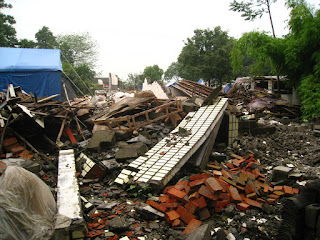Exert from China article...
 Piles of rubble line damaged roads. The team van comes to a sudden halt on a bridge and people gasp, as in front of the vehicle they see a gaping hole caused by the recent May earthquake. The van skirts around and continues on, destroyed infrastructure is commonplace in this part of China.
Piles of rubble line damaged roads. The team van comes to a sudden halt on a bridge and people gasp, as in front of the vehicle they see a gaping hole caused by the recent May earthquake. The van skirts around and continues on, destroyed infrastructure is commonplace in this part of China.
The Sichuan province, where there have been 80,000 deaths, is very different to the Olympic Beijing viewed by the world. Tent cities blot the landscape, a camouflage of green and blue, often situated next to debris that used to be somebody’s home. One team member said, “I’ve spent so much of my time in third world countries. I had to keep reminding myself that this is not where these people normally live.” Five million Chinese are now homeless.
We deployed a team to China in July for two weeks. During that time, the team saw almost 500 patients, though it was not the average medical outreach. Karen, an RN working with us, said, “One thing I noticed was that very few children were attending the clinics.” When a teenage boy visited, he shared that when the earthquake hit, three hundred of his classmates died. This became a familiar story, with many thousands of children killed. It is a situation that has in fact led to China’s infamous one-child policy being “clarified” in the Chengdu region, the capital of Sichuan province. Chinese officials said that the country's one-child policy exempts families with a child killed, severely injured or disabled in the earthquake. Those families can obtain a certificate to have another child.
People in the area where the team served live mainly in farming communities. Many had never seen a doctor before. One team member said, “The people didn’t push as they have in other countries. I don’t think they knew what was available. Out there, if you get sick, you either survive or die.”
Clinics were facilitated in various locations, sometimes in a house or a corn field. One particular day, the team was situated in a tent by the side of the road when, out of nowhere, a small troupe of marching soldiers appeared. They didn’t seem to notice the team of foreigners standing inside the open tent.
Questions and theories abound as to whether China has opened its doors and relaxed control over its citizens. The Chinese government seemed much more open to foreign aid than their Asian neighbor, Burma, when it came to handling relief efforts. But when asked about relief in the region where the earthquake occurred, Karen said, “Except for the tents, it was hauntingly empty.” The team didn’t see any other aid workers in the regions they visited outside Chengdu. This was an unexpected finding, as this period is normally considered the reconstruction stage.
As the team members looked into the eyes of the Chinese people in the Sichuan province, they discovered a mixture of hope and despair. With only two translators, they could often only give an understanding look or a hug. However, there was a refreshing openness and gratitude in these people. People would invite them in and prepare a meal for them, even though they themselves had little to survive on. Karen said, “In spite of their grief, kids would sing songs for us and thank us for coming to help. It was like they were the ambassadors from their country.”
 Piles of rubble line damaged roads. The team van comes to a sudden halt on a bridge and people gasp, as in front of the vehicle they see a gaping hole caused by the recent May earthquake. The van skirts around and continues on, destroyed infrastructure is commonplace in this part of
Piles of rubble line damaged roads. The team van comes to a sudden halt on a bridge and people gasp, as in front of the vehicle they see a gaping hole caused by the recent May earthquake. The van skirts around and continues on, destroyed infrastructure is commonplace in this part of 

No comments:
Post a Comment